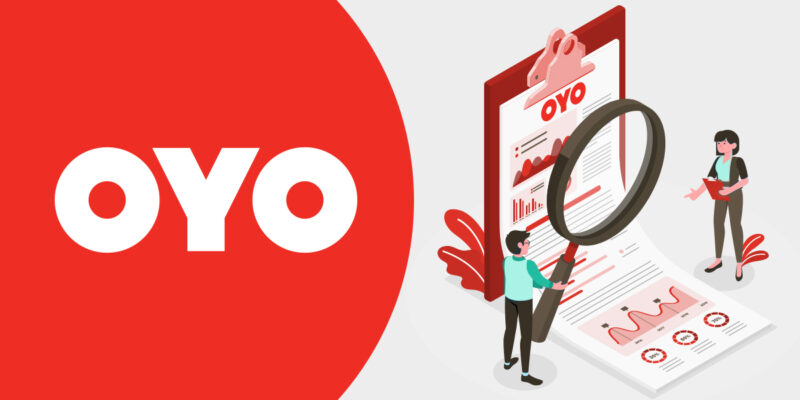Oyo maintained its upward trajectory in the fiscal year ending March 2023 while also narrowing down losses significantly. The growth rate, however, was slower in FY23 than the previous fiscal year’s.
Oyo’s (Oravel Stays) revenue from operations grew 14.3% to Rs 5,464 crore in FY23 from Rs 4,871 crore in FY22, according to its consolidated financial statements sourced from the Registrar of Companies.


Financials FY23
Operating Revenue
Total Expenses
Profit/Loss
View Full Data
View Full Data
View Full Data


The sale of accommodation services and commission from bookings is the major source of revenue for the SoftBank-backed firm. Oyo also made some money from the rental and subscription services.
With 100 plus subsidiaries and a presence in almost every continent, domestic income formed only 25% of the collection which stood at Rs 1,383 crore in FY23 while 75% of its collection came from outside India as an export service.
On the cost side, lease rental and service component of lease accounted for 42% of the overall expenditure. This cost surged 10.3% to Rs 2,843 crore in FY23 from Rs 2,578 crore in FY22. Its employee benefit is the second largest component which shrank 16.8% during FY23. Notably, 40% of the employee cost had an ESOP component (non-cash) in the previous fiscal year.
Oyo’s advertising, commission, information technology, and other operating expenses took the overall cost to Rs 6,800 crore in FY23 as compared to Rs 6,985 crore in FY22. Check TheKredible to see the detailed expense breakdown.


Expenses Breakdown
https://thekredible.com/company/oyo/financials
View Full Data
https://thekredible.com/company/oyo/financials
View Full Data
- Employee benefit expense
- Advertising promotional expenses
- Commission paid other selling agents
- Information technology expenses
- Service component of lease
- Others


According to the financial statements, the company has trade receivables of Rs 158 crore, and cash and bank balances stood at Rs 1,677 crore till March 2023.
A modest increase in scale and effective cost management resulted in a 33.7% reduction in the company’s losses — decreasing from Rs 1,941 crore in FY22 to Rs 1,287 crore in FY23. Its ROCE stood -at 8.63% while the EBITDA significantly improved and became positive during the previous fiscal year, according to the filings.
On a unit level, Oyo spent Rs 1.24 to earn a rupee of operating revenue in FY23.
Profitability ahead
For the ongoing fiscal year, Oyo claims to have registered an adjusted EBITDA of Rs 175 crore in Q1 FY24. The firm also said that it will report its first-ever profit of Rs 16 crore in the second quarter of this fiscal year or Q2 FY24.
Oyo has raised over $3.4 billion across many rounds and was valued at $9.6 billion at its peak. According to the startup data intelligence platform TheKredible, Softbank is the largest external stakeholder with 42.62% followed by Peak XV (Sequoia) and Lightspeed. Its founder and chief executive officer Ritesh Agarwal commands a 33.15% stake in the company.
It’s been a history full of highs and lows for Oyo, and it has to be said the firm has proved many skeptics wrong by not just surviving, but finally coming close to building a viable business. Along the way, the firm may not have quite become the giant straddling the hospitality sector that it was projected to become a few years back, but there is no doubt that it has disrupted and changed the market it operates in. The high share of non-India revenues is probably one reason why most India-based analysts are still to turn into believers again on the firm’s future, but for the firm to even talk about turning profitable is a big deal. The next stage of growth will probably come only after a successful IPO, itself a mountain to climb with the firm’s history. Well wishers will hope that the firm achieves that too eventually, to prove once again that while we might overestimate short term impact, in the long term, we are far more likely to underestimate the changes disruption can bring. As a true disrupter in the hospitality space, Oyo has earned its chances the hard way over the past 3 years.















